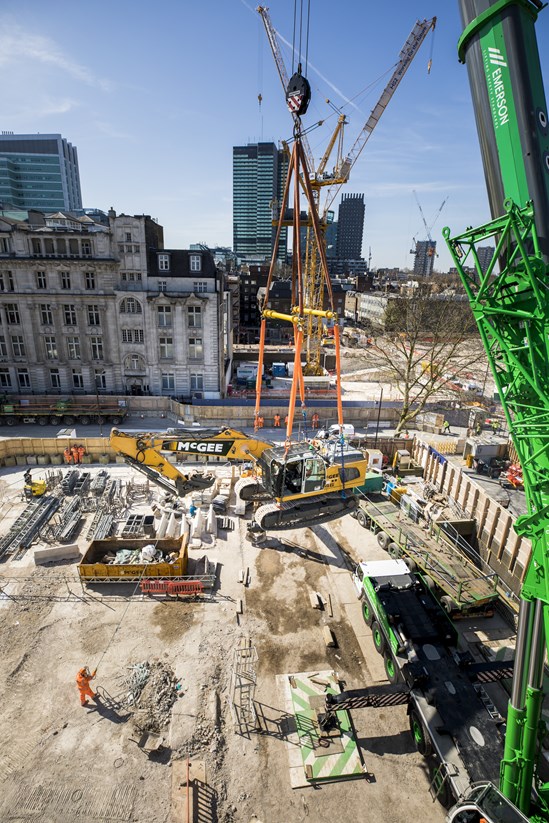Preparations for London’s high speed rail terminus at Euston has reached a new milestone as the two office towers outside the existing station are now at ground level. Grant Thornton House and One Euston Square – designed by prolific and divisive modernist architect Richard Seifert – have made way for the new high speed station, with more space for passengers and better links to the London Underground.
HS2’s enabling works contractor, Costain Skanska joint venture (CSJV), has completed two years’ worth of demolition work, taking the 1970s towers to ground level. The site has now been handed over to the station construction partner, Mace Dragados joint venture (MDJV), who will complete the demolition of the basement below in preparation for the new HS2 station construction works.
To enable the demolition to be carried out, the buildings were encapsulated within an acoustic wrap as the agreed methodology to mitigate noise and dust in the local area. Excavators with breaking and munching attachments were then lifted to the roof using the site tower crane and then worked down the building demolishing floor by floor. Over 35000t of reinforced concrete was demolished and processed on site for re-use on the HS2 Euston scheme. The re-processing works removed approximately 3,000 lorry movements from the local roads, and 99.75% of waste was diverted from landfill.
The final stage of the works, was to demolish the huge 2.7m thick One Euston Square first floor slab. This was completed in two stages. Firstly two 45t excavators with breaking attachments were lifted on to the slab with a 450t mobile crane. These machines removed 60% of the slab working from the top. Once complete they were lifted down and the works were completed using a 45t and 60t excavator from ground level.
Laurence Whitbourn, HS2’s Euston Area Director said:
“We are really making significant progress at Euston to make way for the capital’s new high speed railway terminus. The successful demolition of these buildings to ground level has made a significant difference to the Euston skyline and is paving the way for the new station and oversite development. I want to thank Costain Skanska JV for their work to date to reach this stage.”
Dan Hunt, Costain Skanska JV’s Programme Director said:
“Of over 150 buildings we have demolished, these were some of the most complex to deliver due to the proximity to other buildings, location next to Euston station and the large reinforced concrete pedestal at One Euston Square. I want to thank the whole team who worked together to deliver this piece of work safely using a revised methodology due to the global pandemic.”
The progress has already changed the landscape around Euston, as almost all the buildings required for HS2 have been demolished. HS2 is designed to more than double capacity at Euston - one of the busiest stations in the UK - releasing space on the existing mainline for extra commuter services into the capital. As a result, commuters from places like Milton Keynes could see a 76% increase in the number of seats into Euston during peak hours.









